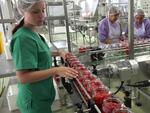На срещата на Европейският съвет в Лисабон през 2000 г. бе определена целта Европа да се превърне в най-конкурентната икономика в света, базирана на непрекъснато развиващото се знание. В основата на тази стратегия е фирмената политика.
Следващите документи представят икономически анализ в сферата на конкурентоспособността (Докладите върху конкурентоспособността) и резултатите от използване на сравнителни стандарти, мониторинг и координирани задачи (Таблици с резултатите от фирмената политика), както и политическите заключения, които Комисията си прави въз основа на тях и включва в своите комюникета относно дебата на Съвета по индустрията върху европейската конкурентоспособност (Комюникета на Комисията: "Производителността: ключът към конкурентоспособността на европейските икономики и предприятия", 2002 г., "Спазване на задълженията, повишаване на ръстта", 2001 г., "По-добро, но не най-доброто. Действия на фирмената политика за подобряване на европейската конкурентоспособност",2000 г.). Основни документи и материалите по въпроса допълват този набор.
The Commission's Competitiveness Report is now at its 8th edition. The 2004 Report focuses on three themes: China, the automotive industry, and the role of government policies in influencing competitiveness. The analysis of government policies includes specific studies of research policy and of efficiency concerns in healthcare provision. The special theme of this Report concerns the impact of public policies on economic performance. Both because of its size and of its involvement in economic life the public sector exerts an important influence on economic performance. The first three Chapters of the Report review the impact of the public sector on productivity growth, the role of public sector funding in research and development and the performance of the health sector, a key component of the public sector. The following, Chapter 4, reviews recent developments in the European automotive sector, a key sector in Europe’s industrial structure, where government regulation is significant and where competitiveness improvements have been realized in recent years. The final, Chapter 5, discusses the growing integration of China in the world economy and its implications for the European economy. These implications are most pronounced in the case of the new Member States which are increasingly competing with Chinese exports.
Some reference documents relate to a BEST project on institutions for the transfer of technology from science to enterprises. The establishment of technology transfer institutions (TTIs) at public research organisations (PROs) and the quality of their services are a factor in the commercialisation process of research results and newly developed technologies. Policy recommendations in the Expert Group Report aim at improving industry-science relations and lowering communication barriers between researchers and entrepreneurs.
Пълният текст на анализа на английски език можете да намерите тук.





















